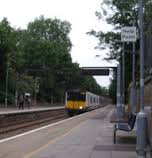The UK’s railways have been hit by the Covid-19 pandemic, but technology can help to get it moving again by providing tools to manage the risk and increase public confidence. This conclusion emerged from a panel discussion of Covid-19 technology recovery in the rail industry, hosted by the business body Resilience First in partnership with Intel.
The trade body the Railway Industry Association has identified rebuilding public confidence as the key to increasing passenger numbers and revenue post-lockdown, but there are many public safety issues that need to be addressed to do this. Cutting edge AI technology can make this huge challenge much easier by automating tasks such as monitoring face mask wearing, managing passenger density and contact tracing.
Robert Hall, Executive Director of Resilience First, said: “In all sectors we are increasingly dependent on technology to help us through the recovery from the virus. Whether it be remote sensing, automated ticketing, storage utilisation, or energy conservation technology solutions can help to offset the disruption caused by the pandemic.”
“Covid-19 has certainly accelerated the search for technological as well as managerial solutions, which have previously taken many years. Whether the regulatory, legal and ethical constraints have kept pace is another question.”
Ellie Wood, Account Executive Transportation at tech firm Intel, said: “Covid-19 has had a huge effect on us all both personally and professionally and has radically changed the way we work now and in the future. Intel’s priority has always been the health and safety of our employees, our customers and our partners.
“To support these efforts Intel has donated £10m to the Covid-19 Relief Fund and also £40m towards tech initiatives supporting access to technology such as speeding up scientific research, patient care and access to online learning for students. That is why we are supporting this series of webinars to enable access to technology partners with tried and tested innovative solutions to help business meet the new ways of working.”
David Clarke, Technical Director of the Railway Industry Association, said: “As an industry we are very proud that the rail network kept the nation moving during the Covid-19 crisis. Government support allowed the rail sector to maintain services, although with a reduced timetable, to get key resources and workers to where they needed to be.”
“However, it is clear that the rail sector has also been impacted by the virus. The UK has seen a collapse in passenger demand, down 96 per cent at the peak, and currently at around 87 per cent – meaning £900m a month in lost ticket revenue.”
“The Government has now declared that it is safe to travel by train and encouraged a return to work. Now the rail sector needs to focus on rebuilding customer confidence, increasing productivity and accelerating our plans for open data, flexible ticketing, decarbonisation and digitalisation, as well as increasing the emphasis on bio-security in our R&D programmes.”
Christian Marez, Senior Business Development Manager EMEA, ADLink Technology, said: “Technology is already used for passenger information, automated fare collection, hazard detection, video security and surveillance using facial recognition. New Covid-19 related products can incorporate face mask detection and counting passengers onboard.”
Dr Spincer Koh, CEO, Gorilla Technology, said: “We have been working with Taiwan CDC since back in December to deploy our technology in airports and train stations. Technology has been deployed very fast by leveraging existing camera and network infrastructure in traffic hubs whilst also maintaining privacy rights. Our vision is to enable AI within a secured network environment, utilising open data but with high levels of data security. Facial recognition, mask detection, temperature check, time logging and contact tracing can all be enabled using existing technology.”
Daren Wood, Vision Director, Resonate, said: “AI can enable the use of data from trackside, timetables and train movements to significantly improve train operating performance. Designing for resilience must involve continual, incremental evolution and making the data available consistently. What has happened in the past few months has caused us to question the assumptions on which many data science models are based. But we must not give up on science and we must continue to look to be guided and not blinded by data.”









